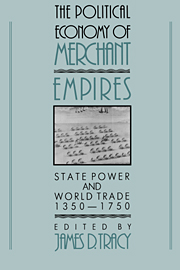Book contents
- Frontmatter
- Contents
- Acknowledgments
- Introduction
- 1 Institutions, Transaction Costs, and the Rise of Merchant Empires
- 2 Merchants and States
- 3 The Rise of Merchant Empires, 1400–1700: A European Counterpoint
- 4 Europe and the Wider World, 1500–1700: The Military Balance
- 5 The Pirate and the Emperor: Power and the Law on the Seas, 1450–1850
- 6 Transport Costs and Long-Range Trade, 1300–1800: Was There a European “Transport Revolution” in the Early Modern Era?
- 7 Transaction Costs: A Note on Merchant Credit and the Organization of Private Trade
- 8 Evolution of Empire: The Portuguese in the Indian Ocean During the Sixteenth Century
- 9 Comparing the Tokagawa Shogunate with Hapsburg Spain: Two Silver-Based Empires in a Global Setting
- 10 Colonies as Mercantile Investments: The Luso-Brazilian Empire, 1500–1808
- 11 Reflections on the Organizing Principle of Premodern Trade
- Selected Bibliography of Secondary Works
- Index
11 - Reflections on the Organizing Principle of Premodern Trade
Published online by Cambridge University Press: 25 March 2010
- Frontmatter
- Contents
- Acknowledgments
- Introduction
- 1 Institutions, Transaction Costs, and the Rise of Merchant Empires
- 2 Merchants and States
- 3 The Rise of Merchant Empires, 1400–1700: A European Counterpoint
- 4 Europe and the Wider World, 1500–1700: The Military Balance
- 5 The Pirate and the Emperor: Power and the Law on the Seas, 1450–1850
- 6 Transport Costs and Long-Range Trade, 1300–1800: Was There a European “Transport Revolution” in the Early Modern Era?
- 7 Transaction Costs: A Note on Merchant Credit and the Organization of Private Trade
- 8 Evolution of Empire: The Portuguese in the Indian Ocean During the Sixteenth Century
- 9 Comparing the Tokagawa Shogunate with Hapsburg Spain: Two Silver-Based Empires in a Global Setting
- 10 Colonies as Mercantile Investments: The Luso-Brazilian Empire, 1500–1808
- 11 Reflections on the Organizing Principle of Premodern Trade
- Selected Bibliography of Secondary Works
- Index
Summary
THE RATIONALE OF PREMODERN TRADE
In the history of human civilization, there are a number of recurrent events and activities that have played a profound and fundamental role. Warfare and trade, so different from one another in their psychological origins, nevertheless are the two indivisible symbols of man's basic desire to look beyond his inner self and of the urge to master the constraints of his immediate natural environment. The demarcation of state frontiers through military and political means breaks up the unity of economic space that long-distance trade subsequently attempts to restore. As a result, the function of trade in social institutions and in the rhythm of economic life is possessed of a dynamic complexity, a variegated richness, that is more easily sensed than it is capable of a single unified analysis. Like the perennial glaciers that sometimes come forward into the valleys and at other times retreat up the mountain sides in long slow movements, the spatial and qualitative dimensions of trade have also expanded and shrunk in response to a wider climate of social, political, and economic frontiers. The sources of energy vitalizing the exchange of objects and movements of long-distance trade can be easily traced to an aggregate composed of many different strands of motivations. The differential rate of technological progress obviously created uneven gradients of material civilizations in which the very inequality of production itself was an incentive to trade. Similarly, division of labor, urbanization, artistic expressions, and acquisitive urges can be listed as some of the organizing principles of commercial exchange.
- Type
- Chapter
- Information
- The Political Economy of Merchant EmpiresState Power and World Trade, 1350–1750, pp. 421 - 442Publisher: Cambridge University PressPrint publication year: 1991
- 3
- Cited by



